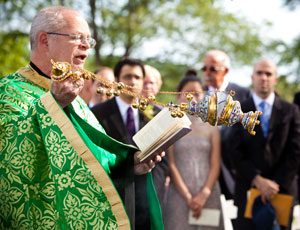February 2019 Reflection
 Dearest Brothers and Sisters,
Dearest Brothers and Sisters,
What is the difference between the one leper who was full of gratitude and the nine who were not? The one had eyes to see and ears to hear and a receptive and open heart, the others did not. "Those who have ears to hear, let them hear," is something Jesus often said at the end of parables. So, there must be both those who do and those who don't. It is reminiscent of this other saying of our Lord, "many are called, but few are chosen." If it's true, as Jesus tells us, that the kingdom of heaven is within us and around us and we can trust the saying from the Gospel of Thomas that the kingdom is spread out upon the earth and we do not see it, then what is there for us to do but awaken to this reality: the kingdom of heaven is not a place to go when we die, but the overarching and foundational reality in which we live and move.
The spiritual life, all of it, is meant to open our eyes and ears and all our senses to the kingdom of heaven within us and among us. "Sometimes," writes the poet Galway Kinnell, "it is necessary to reteach a thing its loveliness." I believe that Jesus came to reteach us just how beautiful we really are.
We are given tools to nurture our senses by Christ and the church, not a formula. The spiritual life does not work like magic - if I do these things, then I will get the result I want. The spiritual life is more like a greenhouse where plants are given what they need to grow and bear fruit, a good temperature, sun, water, good soil, and fertilizer. The good gardener does all he can and then waits with hope and faith, knowing the miraculous power that lies dormant in the seed - not forcing, but nurturing. It is God who makes things grow, not the gardener.
Jesus used parables to tell us what the kingdom of heaven is like because there are no words to adequately describe it. Parables and poetry are the best ways to approach the subJect. So, parables are not so much to be figured out, but wisdom teachings to be savored.
Think of how often Jesus used agricultural imagery to speak of the kingdom. I I am thinking specifically of two: the Parable of Sower and the Parable of the Mustard Seed. The kingdom of heaven is a seed that is planted in the heart of every human being. We have no way of knowing precisely what will trigger the growth of the seed in ourselves and in other people. What we do know is that how we treat others and ourselves, with love or not, has an incalculable effect on the opening or closing of peoples' hearts.
The popular view that the kingdom waits for us at the end of our life of course is true, but is only a small facet of the truth. The truth is that the kingdom is always with us and always present just as God is. We have always been there. We are there now. We will be there then. I am reminded of the line from TS Eliot s poem "Little Gidding," "At the end of all our searching we will arrive at the place we began and know it for the first time."
When we finally awaken to this, then we will see the kingdom come with power. The kingdom comes within us and when it does, we will then see clearly that it has come in power all around us as well. Love and Blessings, Fr. Antony